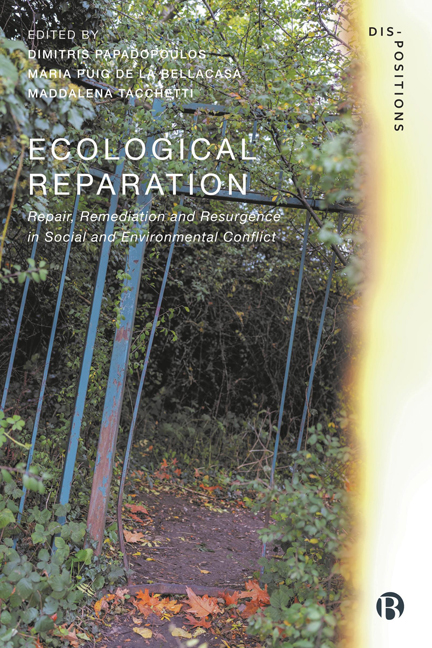Book contents
- Frontmatter
- Contents
- List of Figures
- Notes on Contributors
- Acknowledgements
- Note on the Figures
- Dis-Positions Series Preface
- Introduction: No Justice, No Ecological Peace: The Groundings of Ecological Reparation
- PART I Depletion<>Resurgence
- PART II Deskilling<>Experimenting
- PART III Contaminating<>Cohabiting
- PART IV Enclosing<>Reclaiming Land
- PART V Loss<>Recollecting
- PART VI Representing<>Self-governing
- PART VII Isolating<>Embodying
- PART VIII Growth<>Flourishing
- Index
25 - Being Affected by Páramo: Maps, Landscape Drawings and a Risky Science
Published online by Cambridge University Press: 28 March 2024
- Frontmatter
- Contents
- List of Figures
- Notes on Contributors
- Acknowledgements
- Note on the Figures
- Dis-Positions Series Preface
- Introduction: No Justice, No Ecological Peace: The Groundings of Ecological Reparation
- PART I Depletion<>Resurgence
- PART II Deskilling<>Experimenting
- PART III Contaminating<>Cohabiting
- PART IV Enclosing<>Reclaiming Land
- PART V Loss<>Recollecting
- PART VI Representing<>Self-governing
- PART VII Isolating<>Embodying
- PART VIII Growth<>Flourishing
- Index
Summary
Introduction
We work at Instituto Alexander von Humboldt, a Colombian research institute in charge of biodiversity studies. Colombia is one of the most biodiverse countries in the world, and sadly, it is also one of the countries where the loss of biodiversity is recorded in real-time. Urgency and relevance are familiar feelings pushed by working in this context. For that reason, science, and the authority it confides, is essential in the kind of responsibilities that the institute needs to cover: to inform policy with the best scientific information possible within the framework of funding cuts and a turbulent national political climate, which does not always prioritize environmental issues.
We are both anthropologists, working in a small social scientists’ team amidst many natural scientists. Our role is to analyse the multiple relationships between people and biodiversity in Colombia, integrating our results with the natural sciences on biodiversity. Multidisciplinary work is not always easy, and our position can be described as uncomfortable. In thematic terms, our academic work is related to páramo, defined by natural sciences as a tropical high mountain ecosystem. This chapter articulates diverse stories, experiences and conversations around páramo and the natural and social sciences. We are particularly interested in overcoming the aspiration of integration in interdisciplinary work and look for ways to relate diverse epistemologies, methods and practices, which are only partially coherent, what Jensen and Morita call sophisticated conjunctions (Jensen and Morita, 2020). This chapter is a step further in experimenting with what form these sophisticated conjunctions can take in the context of our quotidian job, especially when this conjunction needs to take the form of a relationship between methods, their materials and the affections that methods and materials convey. Our intuition is that the conservation and restoration of Colombian páramos also require repairing relationships beyond the páramo as ‘nature’ or ‘páramo without people’. In order to participate in this task, the biodiversity sciences would benefit from these sophisticated conjunctions, which we imagine as ecologies of affections that feed sciences that risk novel articulations.
- Type
- Chapter
- Information
- Ecological ReparationRepair, Remediation and Resurgence in Social and Environmental Conflict, pp. 397 - 416Publisher: Bristol University PressPrint publication year: 2023

